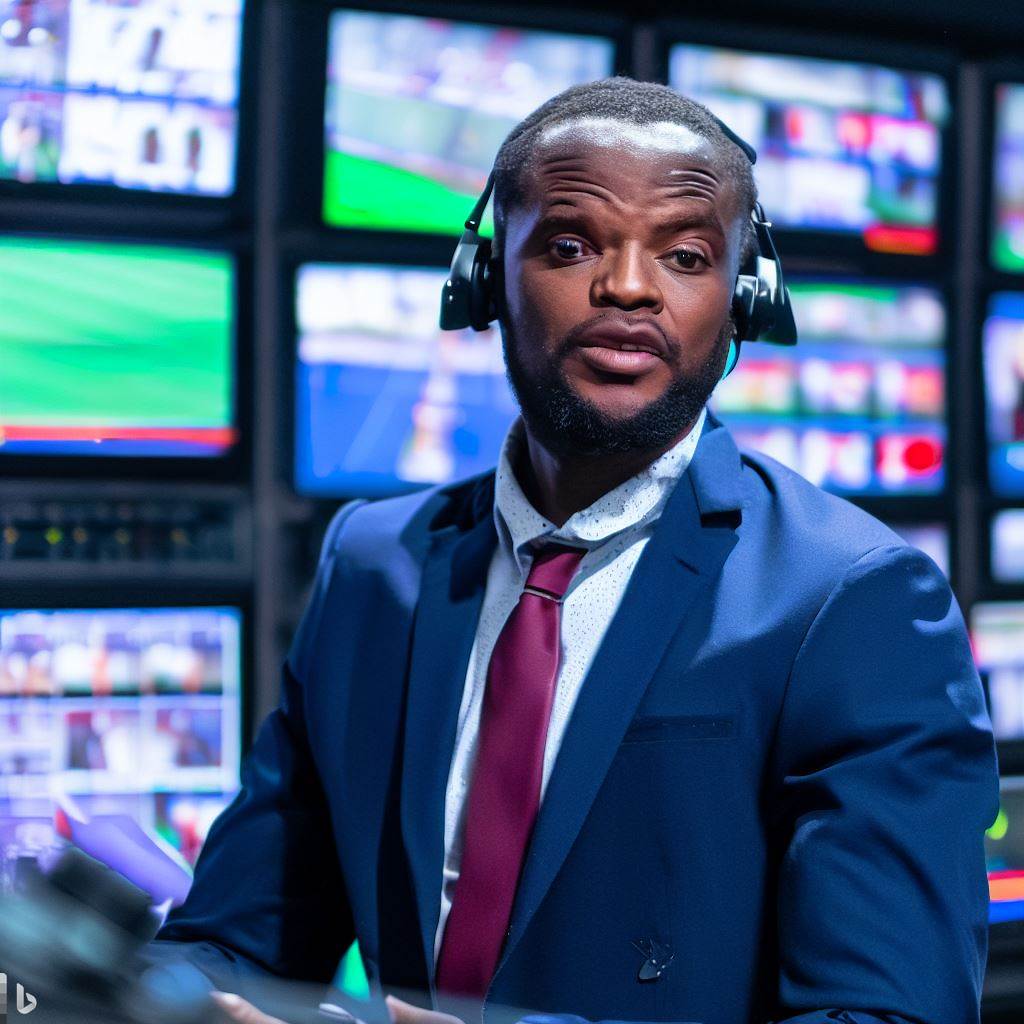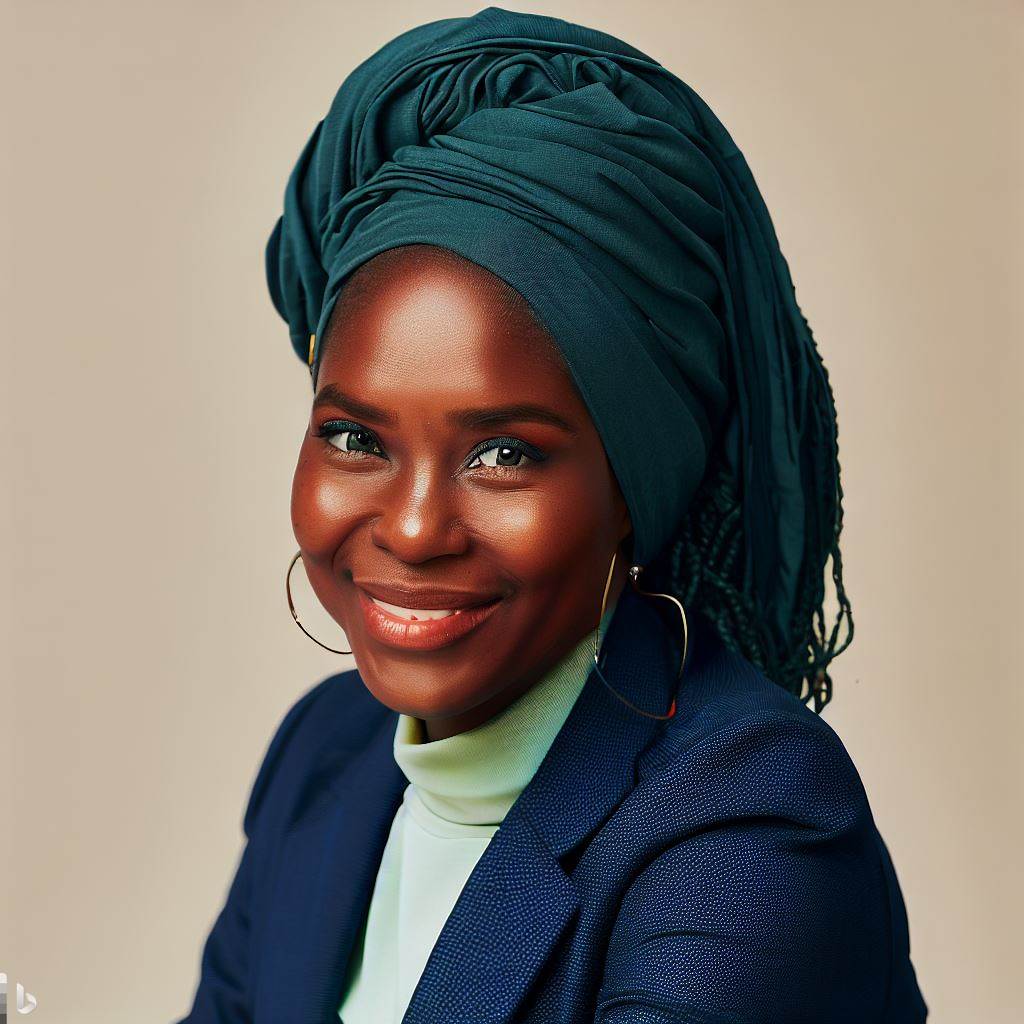Introduction
Nigeria’s sports TV industry is a thriving sector that deserves attention and exploration. Nigeria Sports TV Behind the Scenes
Sports play a crucial role in Nigerian culture, and the industry boasts immense popularity.
This blog post aims to delve into the behind-the-scenes operations of professionals working in Nigeria’s sports TV industry.
Sports hold a special place in Nigerian hearts and are deeply embedded in the country’s culture.
From football to athletics, Nigerians are passionate about various sports and show unwavering support for their favorite teams and athletes.
Amidst this fervor, Nigeria’s sports TV industry has emerged as a significant player, bringing thrilling matches, inspiring stories, and expert analysis to millions of sports enthusiasts across the nation.
The purpose of this blog post is to pull back the curtain and provide an exclusive glimpse into the world of professionals operating behind Nigeria’s sports TV screens.
These individuals are the backbone of this dynamic industry, working tirelessly to deliver top-notch sports broadcasting experiences to viewers.
From the producers who meticulously plan and execute each telecast to the camera crew who capture the exhilarating moments, every role is crucial in presenting sports events in the most engaging manner.
The commentators and analysts provide insightful commentary and expert opinions, enhancing the viewers’ understanding and enjoyment of the game.
The editors and technicians work diligently behind the scenes to ensure seamless broadcasting, constantly adapting to unexpected challenges and demands.
Through this blog section, we aim to shed light on the passion, dedication, and hard work of these professionals.
Their efforts contribute significantly to the success and popularity of sports TV in Nigeria.
Join us as we explore the fascinating world behind Nigeria’s sports TV industry and gain a deeper appreciation for the professionals who make it all possible.
Background of Nigeria’s Sports TV Industry
Overview of the growth and development of sports TV in Nigeria
- In the past decade, Nigeria’s sports TV industry has experienced significant growth and development.
- The demand for sports content has increased, leading to the establishment of dedicated sports TV channels.
- Broadcasting companies have recognized the importance of sports in Nigerian culture and invested in sports programming.
Emergence of dedicated sports TV channels
- The emergence of dedicated sports TV channels has revolutionized the way Nigerians consume sports content.
- Channels such as SuperSport, ESPN Africa, and NTA Sports have gained popularity among sports enthusiasts.
- These channels provide 24/7 coverage of various sports, including football, basketball, athletics, and more.
Increasing coverage and broadcasting rights of Nigerian sports events
- Nigerian sports events have gained more coverage and attention in recent years.
- The broadcasting rights for major Nigerian sports events, such as the Nigeria Professional Football League and the Nigerian Sports Festival, have become highly sought after.
- International sports events, like the FIFA World Cup and the Olympic Games, are also extensively covered by Nigerian sports TV channels.
- This increased coverage has not only provided exposure for Nigerian athletes but has also boosted the popularity of sports in the country.
- The improved infrastructure for broadcasting sports events has enhanced the viewing experience for fans.
- Investments in modern camera technology, high-definition screens, and immersive audio systems have made watching sports on TV more engaging
- The growth of Nigeria’s sports TV industry has also opened up opportunities for professionals in the field.
- Media and broadcasting companies are now hiring skilled cameramen, producers, directors, commentators, and analysts.
- These professionals play a crucial role in delivering top-quality sports content to the audience
- Additionally, the increase in sports TV channels and coverage has led to an increase in advertising and sponsorship opportunities.
- Companies are recognizing the value of sports as a platform to reach a large and engaged audience.
- This has resulted in increased revenue for both sports TV channels and sports organizations.
- Despite the growth and development of Nigeria’s sports TV industry, there are still challenges that need to be addressed.
- Limited access to stable electricity and high-speed internet in some areas hinders the reach of sports TV content.
- The cost of accessing sports TV channels and subscriptions can also be a barrier for some Nigerians.
However, challenges remain, and further efforts are needed to ensure wider access to sports TV content for all Nigerians.
Read: Studying Sports Journalism in Nigeria: Top Universities
Roles and Responsibilities of Sports TV Professionals in Nigeria
The role of producers in coordinating and organizing sports coverage
Producers play a crucial role in coordinating and organizing sports coverage in Nigeria.They are responsible for selecting and scheduling which sporting events will be broadcasted.
Producers also determine the overall format and content of the sports program.They work closely with the technical crew to ensure smooth execution of live broadcasts.
Additionally, producers handle the logistics, such as securing necessary permits and equipment.
The responsibilities of cameramen and technical crew in capturing high-quality footage
Cameramen and the technical crew are responsible for capturing high-quality footage during sports broadcasts.
Cameramen skillfully operate cameras to capture the action and important moments of the sporting events.
They must have a keen eye for detail and the ability to anticipate and follow the flow of the game.
The technical crew ensures that cameras are properly set up and provide technical support during the broadcast.
They handle the audiovisual equipment, ensuring clear sound and smooth video transmission.
The work of sports analysts and commentators in providing insights and commentary during broadcasts
Sports analysts and commentators provide valuable insights and commentary during sports broadcasts in Nigeria.
Analysts analyze the game, providing context, statistics, and expert opinions to enhance viewers’ understanding.
Commentators add excitement and play-by-play narration, keeping viewers engaged throughout the event.
They have in-depth knowledge of the sport and its rules, bringing the action alive for the viewers.
Sports analysts and commentators also contribute to the overall storytelling and narrative of the sports coverage.
The importance of studio hosts in engaging viewers and facilitating discussions
Studio hosts in Nigeria play a vital role in engaging viewers and facilitating discussions during sports broadcasts.
They introduce the program, set the stage, and create a welcoming atmosphere for the viewers.
Studio hosts often conduct pre and post-match discussions, sharing their own analysis and inviting experts to join.
They interact with viewers through social media, taking live questions and comments.
The hosts keep the program flowing smoothly, ensuring seamless transitions between different segments.
Sports TV professionals in Nigeria have distinct roles and responsibilities.
Producers coordinate and organize sports coverage, while cameramen and technical crews capture high-quality footage.
Sports analysts and commentators provide insights and commentary, and studio hosts engage viewers and facilitate discussions.
Collaboratively, these professionals create an immersive and informative sports viewing experience for the audience.
Read: Impact of Technology on Sports Broadcasting in Nigeria
Challenges Faced by Sports TV Professionals in Nigeria
Limited resources and infrastructure available for sports TV production
- Inadequate funding for equipment, facilities, and technical expertise hinders quality production.
- Lack of modern technology like high-definition cameras limits the visual appeal of broadcasts.
- Insufficient training and development programs prevent professionals from upgrading their skills.
- Limited access to reliable internet connection and power supply disrupts live broadcasting.
Difficulties in securing broadcasting rights and sponsorship deals
- High cost of acquiring broadcasting rights for popular sports events puts a strain on resources.
- Limited competition in the broadcasting industry reduces negotiation power with rights holders.
- Lack of transparency and corruption in the process of securing rights undermine fair opportunities.
- Insufficient sponsorship deals result in reduced revenue and challenges in funding production costs.
Challenges of covering sports events in remote or conflict-affected areas
- Inadequate transportation infrastructure makes it difficult to reach remote locations for event coverage.
- Security concerns in conflict-affected areas pose risks to the safety of sports TV professionals.
- Limited communication networks hinder real-time reporting and transmitting of live events.
- Lack of proper facilities and accommodation in remote areas affects the production quality and comfort of professionals.
Despite these challenges, sports TV professionals in Nigeria strive to overcome limitations and deliver quality content to viewers.
Efforts to overcome these obstacles include:
- Collaboration with international broadcasters and production companies to share resources, technology, and expertise.
- Seeking innovative solutions such as using mobile broadcasting units to cover events in remote areas.
- Engaging local communities to improve infrastructure and facilities in remote locations.
- Advocating for favorable policies and regulations that support the development of sports TV industry.
- Enhancing training programs and providing mentorship opportunities to develop skilled professionals.
The Nigerian sports TV industry has shown resilience and determination to overcome challenges.
With continued efforts to improve resources, secure broadcasting rights, and adapt to challenging environments, the industry has the potential to grow and thrive.
Sports TV professionals in Nigeria can offer engaging and comprehensive coverage to nationwide sports enthusiasts by tackling resource limitations, securing broadcasting rights, and reaching remote areas.
Read: Women in Sports Broadcasting: Profiles from Nigeria

You Might Also Like: Physical Education Careers in Nigeria: A Beginner’s Guide
Delve into the Subject: Rising Stars in Nigeria’s Sports and Athletics Scene
Success Stories from Nigeria’s Sports TV Industry
Profile successful sports TV channels and programs in Nigeria
- SuperSport Nigeria: A popular sports TV network that broadcasts a wide range of sports events.
- NTA Sports: The national broadcaster that covers major national and international sports competitions.
- Channels Sports: Known for providing in-depth analysis and coverage of sports events.
- Kwesé Sports: Offers a diverse range of sports programming, including live matches and sports news.
- Sports Radio: A radio station dedicated to sports coverage, engaging listeners with live commentaries.
Anecdotes and experiences from notable sports TV professionals
- Mary Onyali: Former Nigerian sprinter and now a sports commentator, providing expert analysis and insights.
- Austin Okocha: Former Nigerian football player turned sports presenter, showcasing his wealth of experience.
- Kayode Tijani: A renowned sports journalist and presenter, known for his engaging and informative interviews.
- Kate Abdo: Nigerian-born British sports presenter, who started her career in Nigeria before finding success globally.
- Chisom Mbonu-Ezeoke: A rising star in sports broadcasting, known for her lively and engaging style.
The positive impact of sports TV on promoting Nigerian sports and athletes
- Increased visibility: Sports TV channels bring Nigerian athletes and sports to a wider audience.
- Sponsorship and investment: Successful sports TV programs attract sponsors and funding for Nigerian sports.
- Talent development: Sports TV provides a platform for showcasing young and emerging talents in Nigeria.
- Inspiring the younger generation: Aspiring athletes see successful sports TV professionals as role models.
- Enhancing sports culture: Sports TV programs create excitement and passion for Nigerian sports among viewers.
Nigeria’s sports TV industry has witnessed remarkable success stories, with channels and programs that have made significant contributions to promoting Nigerian sports and athletes.
SuperSport Nigeria, NTA Sports, Channels Sports, Kwesé Sports, and Sports Radio have been instrumental in bringing live matches, analysis, and sports news to the Nigerian audience.
Mary Onyali, Austin Okocha, Kayode Tijani, Kate Abdo, and Chisom Mbonu-Ezeoke, notable sports TV professionals, share their experiences, boosting Nigerian sports TV growth.
Sports TV’s positive impact is clear: it boosts visibility, creates sponsorship opportunities, nurtures talent, inspires youth, and enhances Nigeria’s sports culture.
Read: Continuing Education for PE Teachers in Nigeria
Future Prospects and Innovations in Nigeria’s Sports TV Industry
Potential Impact of Technology Advancements on Sports TV Production
- The advancement of technology has the potential to revolutionize sports TV production in Nigeria.
- Improved cameras and broadcasting equipment can enhance the viewers’ experience of sporting events.
- High-definition and 4K broadcasts can provide viewers with a clearer and more immersive watching experience.
- Advanced graphics and visual effects can bring an extra layer of excitement to sports broadcasts.
- New technology like drones can offer unique angles and perspectives of the sporting action.
- Real-time data visualization tools can provide viewers with insightful statistics and analysis during the game.
- Virtual reality (VR) technology has the potential to transport viewers directly into the midst of the sporting event.
- Augmented reality (AR) can provide interactive overlays, adding a new level of engagement to sports TV.
- Live streaming capabilities can enable viewers to watch sports events from anywhere, using their mobile devices.
- Technology advancements can also improve the production workflow, making it more efficient and cost-effective.
Emerging Trends: Virtual Reality and Interactive Viewing Experiences
- Virtual reality (VR) is one of the most exciting emerging trends in the sports TV industry.
- With VR, viewers can feel as if they are right in the stadium, witnessing the action up close.
- They can choose their own vantage point, switch between different cameras, and even interact with virtual objects.
- VR headsets offer a fully immersive experience that can transport viewers to the heart of the game.
- Interactive viewing experiences allow viewers to customize their sports TV experience.
- They can access additional camera angles, follow specific players, or receive personalized in-game statistics.
- Viewers can engage with the broadcast through social media integration, polls, and live chats.
- This level of interactivity enhances viewer engagement and creates a more personalized sports TV experience.
- As technology continues to evolve, virtual reality and interactive viewing experiences will become more accessible and widespread.
- Sports TV broadcasters in Nigeria should embrace these trends to attract and retain a larger audience.
Expanding Sports TV Coverage to Lesser-Known Sports and Grassroots Events
- Nigeria’s sports TV industry has predominantly focused on popular sports like football and basketball.
- However, there is a vast potential for expanding coverage to lesser-known sports.
- By diversifying their programming, sports TV broadcasters can cater to niche audiences and cultivate new fanbases.
- Emerging sports like boxing, tennis, athletics, and cycling can gain more visibility through increased TV coverage.
- Furthermore, grassroots events, such as local tournaments and school competitions, deserve more attention.
- By featuring these events on sports TV, aspiring athletes can receive recognition and inspire others.
- Expanding coverage to lesser-known sports and grassroots events will contribute to the overall growth of Nigerian sports.
- Sports TV broadcasters should invest in scouting and producing content that showcases the country’s diverse sporting landscape.
- By giving these sports and events a platform, Nigeria’s sports TV industry can contribute to talent development and national pride.
- The possibilities are endless, and the expansion of sports TV coverage will create opportunities for both athletes and broadcasters.
As the future unfolds, technology advancements will undoubtedly shape the sports TV industry in Nigeria.
With improved production capabilities, virtual reality experiences, and expanded coverage, the industry has the potential to engage viewers like never before.
By embracing these innovations, Nigeria’s sports TV professionals can pave the way for a more exciting and inclusive sports media landscape.
Conclusion
In this blog post, we explored the behind-the-scenes world of Nigeria’s sports TV industry. We learned about the hard work and dedication of professionals in this field.
The work of professionals in Nigeria’s sports TV industry is crucial for the growth and development of sports in the country. Their expertise and efforts contribute greatly to the sports culture of Nigeria.
They have in-depth knowledge of the sport and its rules, bringing the action alive for the viewers.
Sports analysts and commentators also contribute to the overall storytelling and narrative of the sports coverage.
It is important for readers to appreciate and support sports TV professionals.
By doing so, we can ensure that they continue their valuable contributions to Nigeria’s sports industry. Let’s celebrate and encourage their talents and dedication.




